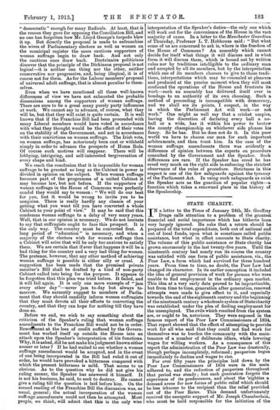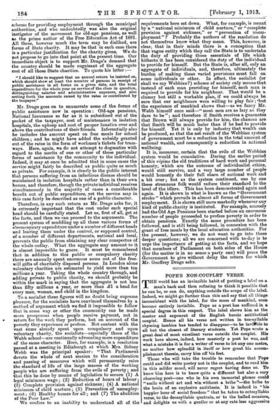STATE CHARITY.
IN a letter to the Times of January 24th, Mr. Geoffrey Drage calls attention to a problem of the greatest financial and social importance which has hitherto been very largely ignored. He asks that a return should be prepared of the total expenditure, both out of national and out of local funds, upon what is sometimes called public assistance, but what in effect amounts to State charity. The volume of this public assistance or State charity has grown enormously in the last twenty-five years. Until the nineteenth century had nearly run its course the country was satisfied with one form of public assistance, viz., the Poor Law, a form which had survived for three hundred years. From time to time, no doubt, the Poor Law had changed its character. In its earlier conception it included the idea of general provision of work for persons who were unable to find employment in the ordinary open market. This idea at a very early date proved to be impracticable, but from time to time, generation after generation, renewed attempts were made to give effect to it, and especially towards the end of the eighteenth century and the beginning of the nineteenth century a wholesale system of State charity was established under the plea of finding employment for the unemployed. The evils which resulted from the system are, or ought to be, notorious. They were exposed. in the famous report of the Poor Law Commissioners of 1834. That report showed that the effect of attempting to provide work for all who said that they could not find work for themselves was to burden the community with the main- tenance of a number of deliberate idlers, while lowering wages for willing workers. As a consequence of this report the administration of the Poor Law was drastically, though perhaps incompletely, reformed ; pauperism began immediately to decline and wages to rise. For over fifty years the principles laid down by the Poor Law Commissioners of 1834 were in the main adhered to, and the reduction of pauperism throughout that period was steady ; but each generation forgets the experience of its predecessors, and about the 'eighties a demand arose for new forms of public relief which should be less irksome to the recipient than the relief provided out of the Poor Rates. This demand unfortunately received the energetic support of Mr. Joseph Chamberlain, who must be held responsible for the initiation of the scheme for providing employment through the municipal authorities, and who undoubtedly was also the original instigator of the movement for old-age pensions, as well as the prime author of the Free Education Act of 1891. All these, however much the term may be disliked, are forms of State charity. It may be that in each case there is a particular justification for the charity given. We do not propose to go into that point at the present time. Our immediate object is to support Mr. Drage's demand that the country should be made cognisant of the aggregate cost of all these State charities. To quote his letter :— " I should like to suggest that an annual return be insisted on, which should show at least the number of persons in receipt of public assistance in all forms on a given date, and the total expenditure for the whole year on service of the class in question, distinguishing salaries and administrative expenses, and also setting forth the amounts raised by the rates or contributed by the taxpayer."
Mr. Drage goes on to enumerate some of the forms of public assistance now in operation : Old-age pensions, National Insurance so far as it is subsidized out of the pocket of the taxpayer, cost of maintenance in isolation hospitals, the upkeep and cost of pauper lunatics over and above the contributions of their friends. Inferentially also he includes the amount spent on free meals for school children ; and he might have added the subsidy granted out of the rates in the form of workmen's tickets for tram- ways. Here, again, we do not attempt to dogmatize with regard to the merits of one or other of these particular forms of assistance by the community to the individual. Indeed, it may at once be admitted that in some cases the service might fairly be described as public quite as much as private. For example, it is clearly to the public interest that persons suffering from an infectious disease should be maintained in isolation hospitals rather than in their own homes, and therefore, though the private individual receives simultaneously in the majority of cases a considerable benefit out of public expenditure, yet the service may in this case fairly be described as one of a public character.
Therefore, in any such return as Mr. Drage asks for, it is extremely important that the cost under each special head should be carefully stated. Let us, first of all, get at the facts, and then we can proceed to the arguments. The present system of muddling up all these various forms of eleemosynary expenditure under a number of different heads and leaving them under the control, or supposed control, of a number of different departments, national and local, prevents the public from obtaining any clear conspectus of the whole outlay. What the aggregate may amount to it is almost impossible to guess. It must be remembered that in addition to this public or compulsory charity there are annually spent enormous sums out of the free- will gifts of charitably disposed persons. In London alone voluntary charities are estimated to yield more than ten millions a year. Taking the whole country through, and adding private to public charity, we should probably be within the mark in saying that the aggregate is not less than fifty millions a year, or more than £1 a head for every man, woman, and child in the kingdom.
To a socialist these figures will no doubt bring supreme pleasure, for the socialists have convinced themselves by a method of argument which we find it impossible to follow that in some way or other the community can be made more prosperous when people receive payment, not in • return for the work they perform, but on account of the poverty they experience or profess. Not content with the vast sums already spent upon compulsory and upon voluntary charity, the socialists—especially those of the Webb school—are continually advocating more expenditure of the same character. Here, for example, is a resolution passed at a meeting in Edinburgh at which Mrs. Sidney Webb was the principal speaker : " That Parliament devote the whole of next session to the consideration and passing of measures which will permanently raise the standard of life of the large masses of the working people who are suffering from the evils of poverty ; and that this be done by means of legislation to secure (1) A legal minimum wage ; (2) Reduction of hours of labour ; (3) Complete provision against sickness ; (4) A national minimum of child nurture ; (5) Prevention of. unemploy- ment ; (6) Healthy homes for all ; and (7) The abolition of the Poor Law."
We confess to an inability to understand all of the requirements here set down. What, for example, is meant by a " national minimum of child nurture," or " complete provision against sickness," or " prevention of unem- ployment" ? Probably the authors of the resolution do not themselves know what they mean. This, however, is clear, that in their minds there is a conception that that vague entity which they call the State is to undertake the duty of providing those essentials of life which hitherto it has been considered the duty of the individual to provide for himself. But the State is, after all, only an aggregate of individuals, and, therefore, ultimately the burden of making these varied provisions must fall on some individuals or other. In effect, the socialist (or shall we say Webbian?) scheme of society only means that instead of each man providing for himself, each man is required to provide for his neighbour. That would be a clumsy but still a workable plan, if we could always be sure that our neighbours were willing to play fair ; 'but the experience of mankind shows that—as we fancy Mr. Webb himself once said—" most men are as lazy as they dare to be "; and therefore if Smith receives a guarantee that Brown will always provide for him, the chances are that Smith will be much lazier than if he had to provide for himself. Yet it is only by industry that wealth can be produced, so that the net result of the Webbian system of government must be a reduction in the total amount of national wealth, and consequently a reduction in national wellbeing.
It is, moreover, certain that the evils of the Webbian system would be cumulative. During the earlier period of this regime the old traditions of hard work and personal honesty, which are the outcome of individualist ethics, would still survive, and a very large number of people would honestly do their full share of national work and a bit over ; but as the system continued, one by one these strenuous folk would reduce their standard to the level of the idlers. This has been demonstrated again and again. It is shown in what is known as the "Government stroke " which prevails in almost all forms of Government employment. It is shown still more markedly whenever any kind of public charity is instituted. For example, scarcely had the Old Age Pensions been started before an enormous number of people proceeded to profess poverty in order to obtain pensions. Exactly the same procedure has been followed, and is still being followed, in connexion with the grant of free meals by the local education authorities. For the present, however, we do not want to go into these deeper questions ; all we are concerned with to-day is to urge the importance of getting at the facts, and we hope that members of Parliament on both sides of the House (for the matter is in no sense a party one) will press the Government to give without delay the return for which Mr. Geoffrey Drage asks.











































 Previous page
Previous page